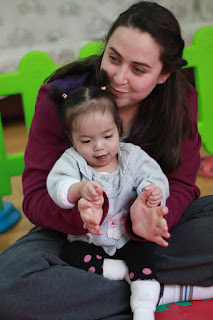Our very first Launchpad home is in north central China. Last year, when YJ first approached us with his doubts and concerns for the future, there were two more young men who had previously been cared for in Little Flower homes who also joined the discussion. One more young man also from the same orphanage heard about our plans. He was intrigued, and he asked if we could consider allowing him to join our Launchpad home as well.
After the boys discussed their plans with the orphanage leaders and received approval to proceed, our first task was to find a suitable apartment to rent. While there are many inexpensive housing options in outlying areas, we were limited to a rather central location in the city so that the boys could easily get back and forth to their vocational center, shopping, church etc. without having to make multiple transfers on the bus or subway. An even higher priority was finding housing that was handicapped accessible.
With two of the four in wheelchairs and one dependent on crutches, we knew that having to navigate stairs or narrow doorways would be a problem. We involved the boys in the search; letting them browse the available listings and contact agents directly. They considered many different homes before finally, we found just what we were looking for!
We had hoped to get a furnished rental, but since that didn't happen we started shopping for furniture. The boys did some research, and it turned out that IKEA was the best option for inexpensive, durable, basic furnishings. They worked out exactly what pieces were needed, how much it would cost, and put together a detailed list for approval by our accounting department. We were able to get some of the large appliances and kitchen wares donated, and soon the empty apartment was filled with many flat packed boxes of furniture ready to assemble. It was a very daunting task, and the boys had no real experience with this kind of project!
Fortunately, several kindhearted volunteers offered to supervise and assist in the furniture assembly. After many long hours of hard work, their new home was ready!
While all of this was going on, we were also searching for a set of house parents who could help guide our young men along the path to independence. This proved much more difficult than we expected, but we finally found Mr. Sun and Mrs. Qin (women in China do not take their husband's surname when they marry), who have a long history of helping to care for disabled children as foster parents.
This fall has been a period of adjustment, with the boys and house parents getting to know each other, each settling in to their roles and responsibilities in the family.
The boys spend their days at a nearby vocational training center, and the house parents also volunteer there helping to prepare lunch for the students and staff.
There have certainly been some rough patches and many conflicts; as we discussed in our last post what we are doing involves big changes and lots of hard work! But we are all so excited to be started along the path to our goals, and we can't wait to see what the future holds!
If you would like to support Launchpad, click below! ⬇⬇⬇
































